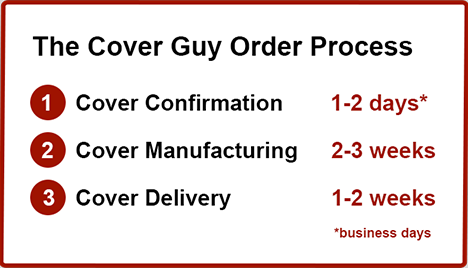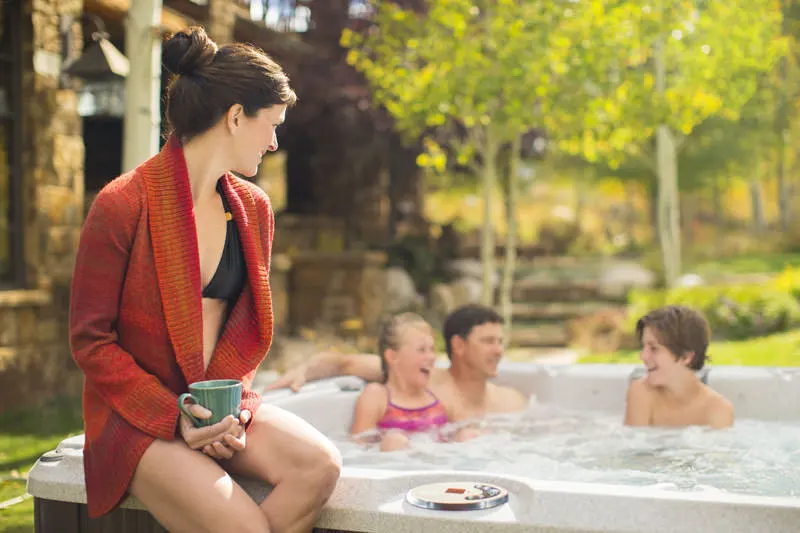The question is often asked, “Which is better, bromine or chlorine?”
As a pool or hot tub owner, you know chemicals are a must to keep your water clean and sanitized. Managing the use of these chemicals is not all that difficult and you can read more about how to do so effectively here. In this article, we want to focus on the pros and cons of using either chlorine or bromine to maintain your hot tub.
At The Cover Guy, we offer all the chemicals you need to maintain your hot tub. We even make it easy and have chemical kits that include all the products you will need. We offer the option of either bromine specific or chlorine specific kits. Why offer a choice? For a variety of reasons that we will explore below. In the end, it comes down to personal preference.
Let’s start with …
Type of Sanitizer: Oxidizer vs Ionizer
Chlorine
Chlorine is an effective oxidizer of contaminants. After the chlorine dissipates quickly in the water, it will leave behind chloramines which can cause stinging and dry skin. Continued proper use of chlorine will ensure your level of chloramines remain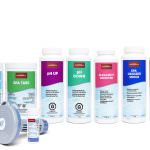 relatively stable. If chlorine is not maintained, you will soon find algae and bacteria start growing. Dichlor is a balanced form of chlorine that is highly recommended for sanitizing hot tubs.
relatively stable. If chlorine is not maintained, you will soon find algae and bacteria start growing. Dichlor is a balanced form of chlorine that is highly recommended for sanitizing hot tubs.
Trichlor, a chemical commonly used in swimming pools, is not recommended for use in your hot tub, however. It becomes highly corrosive in warm water and can damage your spa.
- Chlorine levels should be between 1.5 – 3.0 ppm
Bromine
Bromine, on the other hand, ionizes contaminants. Bromine creates bromamines, and just like chloramines, will cause some side effects and will eventually reduce the effectiveness of the bromine. Some say that after long soaks in the hot tub, bromine is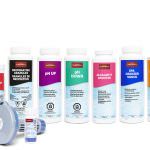 harder to wash off.
harder to wash off.
Sensitive skin or respiratory issues? Bromine is probably the better option.
- Bromine levels should be between 3.0 – 5.0 ppm
Summary
Both chlorine and bromine are sanitizers that work in different ways to keep your water free of contaminants. Regular use of either chlorine or bromine will help keep your hot tub clean.
The way they do it is different, but the results are similar. The effectiveness is the same (we’ll go into more detail on that next) and both can have some side effects.
Either way, you will need to shock your water every now and then to keep your water clean and clear. Even if you are stringent with your chemical maintenance plan (we have a guide for that!), shocking your water regularly will be required.
Effectiveness and Reactivity
Which is more reactive: Chlorine or Bromine? The answer is simple: Chlorine is.
Chlorine reacts faster than bromine. This means that chlorine will destroy contaminants faster than bromine. It also means that it will dissipate quicker.
Bromine, on the other hand, has a more stable pH and makes it easier to maintain the proper chemical balance in your water. That said, it also reacts to UV which means UV light will destroy the bromine in the water faster than chlorine. This is important if you have an outdoor tub. Make sure you have a cover for your hot tub! This will help the UV light from penetrating and burning up the bromine.
At higher water temperatures, bromine remains more stable than chlorine, which is one of the reasons it dissipates less quickly than chlorine.
Both chlorine and bromine are efficient chemicals for keeping your water from turning green and gross.
Use & Cost
More bromine will be required than chlorine to get the same clean results. Bromine also tends to be more costly than chlorine. On the other hand, you tend to use bromine less often than chlorine, so it is possible that the cost of using bromine or chlorine actually equals itself out over time. The size of your hot tub and how well your water is balanced will also play factors in cost and dosage.
You can dispense chlorine and bromine in granule or tablet form. Granules are tossed into the water without any special device.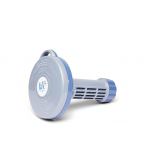 The tablet form is dispensed through a special floater. The tablet form will allow, over time, an equal distribution of sanitizer into the water.
The tablet form is dispensed through a special floater. The tablet form will allow, over time, an equal distribution of sanitizer into the water.
Typically, you will need to use chlorine every other day or so, but bromine may be used only once a week.
Pro Tip: NEVER mix chlorine and bromine together. Not in the water and not in dry form either. It may cause a nasty chemical reaction.
Both chlorine and bromine will require regular testing to ensure the pH levels remain acceptable. Are chlorine and bromine test strips the same? Depends on the brand. Check before you purchase your test kits to ensure it will be accurate for the type of sanitizer you use.
Other Factors to consider
Allergies, sensitivities and respiratory issues should also be taken into consideration when deciding to use one chemical or the other:
- If someone is allergic to chlorine, neither chemical will work as they are both chlorine based.
- If someone has respiratory issues or sensitive skin, bromine is probably the better choice as it will emit a less offensive smell.
- Bromine is more difficult to wash off because of its long lasting stability.
Water transparency might be another consideration. While chlorine keeps your water crystal clear by breaking down oils and other organic matter, bromine will not. Using bromine will mean that your water may not be as clear.
Factors to Consider (Summary):
| Factor to Consider | Chlorine | Bromine |
| Frequency of use | More Often | Less Often |
| Effectiveness | Excellent | Excellent |
| UV Reaction | No – stabilized with a conditioner | Yes – cannot be stabilized |
| Cost | Less expensive | More expensive |
| Personal Sensitivities (Skin or Respiratory) | Strong smell | Less smell, but harder to wash off |
| Water Clarity | Clear | Cloudy |
| pH Balance | Harder to maintain | Easier to maintain |
Conclusion
So chlorine vs bromine. Which is it? Both chlorine and bromine are great options to keep your hot tub water clean. Their effectiveness should not be in question. What it comes down to is your personal preference and sensitivities. Both options have pros and cons to consider.
Whether you or someone in your family has sensitivities, or perhaps you want to take into consideration the time involved in maintaining the chemical balance of the water, or even consider cost as a factor, it all comes down to what chemical will work best for you.
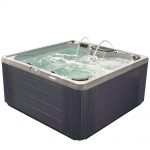 Final advice: If you are thinking of switching from one chemical to the other, know that you will have to empty your hot tub and flush your line. It is important that chlorine and bromine do not come into contact with each other. As previously mentioned, a dangerous chemical reaction can ensue.
Final advice: If you are thinking of switching from one chemical to the other, know that you will have to empty your hot tub and flush your line. It is important that chlorine and bromine do not come into contact with each other. As previously mentioned, a dangerous chemical reaction can ensue.
Whichever way you choose to go, The Cover Guy has you covered! Check out our chemical kits and sign up to receive our free Hot Tub Maintenance guide to help keep your chemicals in check! If you have any questions, please feel free to reach out to us. We are always happy to help.
